Discovering the role of various foods in weight loss is crucial for an effective diet strategy. The question, ‘Is Bok Choy beneficial for weight loss?’ might not immediately reveal the full potential of this leafy green.
This article is dedicated to exploring the notable advantages of Bok Choy, illuminating its role in enhancing weight loss and overall health.
Read more
- Are Deviled Eggs Good for Weight Loss? Nutritional Facts.
- Is Edamame Good for Weight Loss? Benefits of Edamame.
- Is Greek Yogurt Good for Weight Loss? Shed Pounds Creamily.
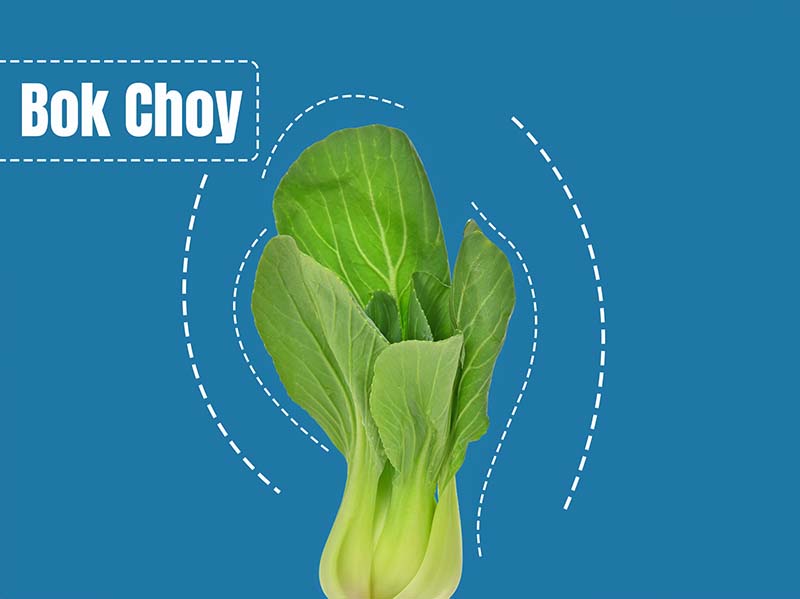
Is Bok Choy Good for Weight Loss?
Bok choy is a stellar choice for anyone on a weight loss journey, thanks to its remarkably low calorie count and rich nutritional profile. This leafy green packs a punch in terms of health benefits while keeping the calorie and fat content minimal. For every 100 grams of raw bok choy you consume, you’re only taking in about 13 calories. This makes it a smart pick for weight-conscious eaters.
What’s more, bok choy is loaded with dietary fiber. This is great news for your diet because fiber helps you feel full longer, reducing the urge to snack and aiding in weight control. There’s also emerging research indicating that bok choy might play a role in reducing fat buildup in the body, adding to its repertoire of weight management benefits.
Incorporating bok choy into a well-rounded diet can be a strategic move for those targeting weight loss. It’s not just about cutting calories, but also about nourishing your body with the right foods.
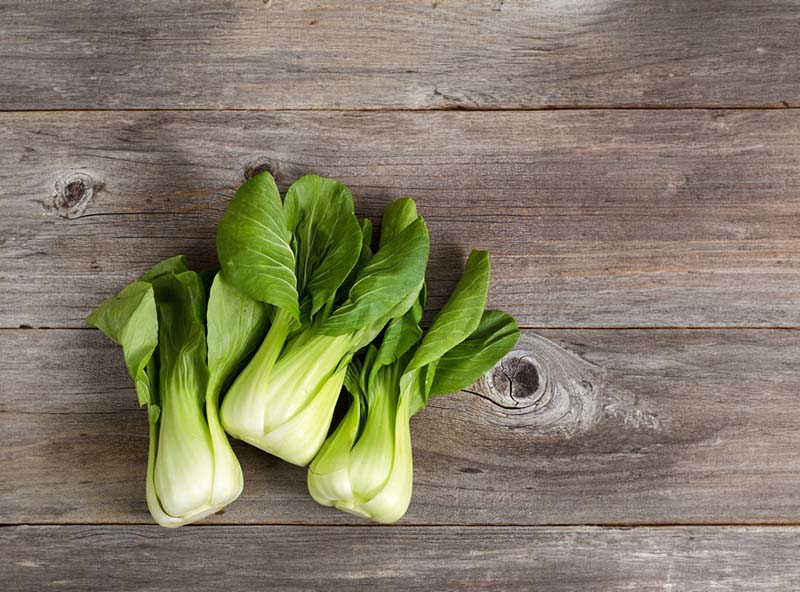
Nutrient Profile of Bok Choy
A single cup of shredded bok choy, weighing approximately 70 grams, offers an impressive array of nutrients with a minimal calorie count. This nutritional powerhouse contains only 9 calories, making it an excellent choice for those monitoring their calorie intake. Bok choy is also a source of protein, with 1 gram per serving, and is completely fat-free.
Carbohydrate-wise, it’s quite low, with just 1.5 grams per serving, out of which 1 gram is sugar and another 1 gram is dietary fiber. This fiber content is beneficial for digestive health and can aid in maintaining a feeling of fullness.
When it comes to vitamins and minerals, bok choy is a treasure trove. It provides 6% of your daily calcium needs, essential for strong bones and teeth. Iron, crucial for blood health, is present at 3% of the daily value (DV). Magnesium and phosphorus, both important for various bodily functions, contribute 3% and 2% of the DV, respectively. Additionally, it offers a decent amount of potassium (4% of the DV), essential for heart and muscle function.
Trace minerals in bok choy include zinc (1% of the DV), manganese (5% of the DV), and selenium (1% of the DV). These play various roles in immune function, bone health, and antioxidant protection.
Vitamin-wise, bok choy is a star. It delivers a whopping 35% of the DV for Vitamin C, known for its immune-boosting properties. Folate, important for cell growth and metabolism, is present at 12% of the DV. The vitamin A content is notable too, at 17% of the DV, which is vital for eye health. Lastly, Vitamin K, crucial for blood clotting and bone health, is provided at 27% of the DV.
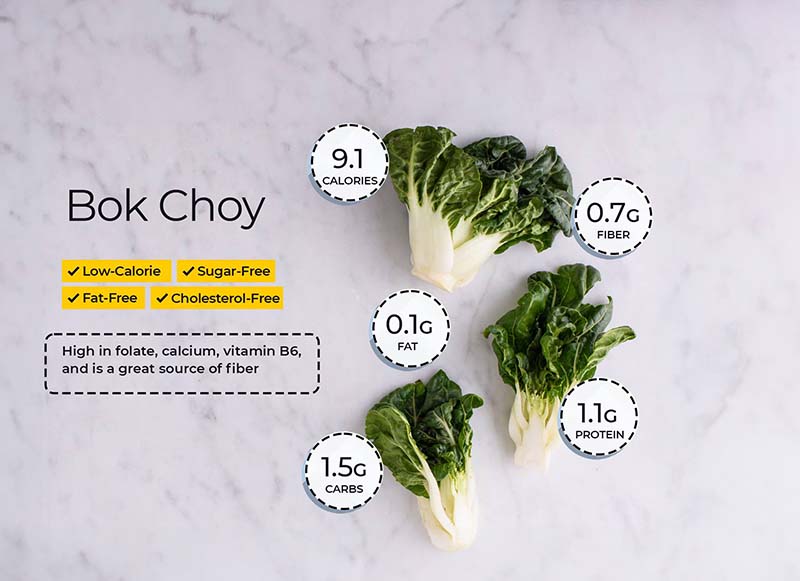
Health Advantages of Bok Choy
Bok choy isn’t just a crunchy and tasty vegetable; it’s a nutritional goldmine, brimming with fiber, vitamins, minerals, and other nutrients that significantly bolster your diet. As a dark, leafy green, it’s rich in antioxidants and beneficial compounds that enhance overall health.
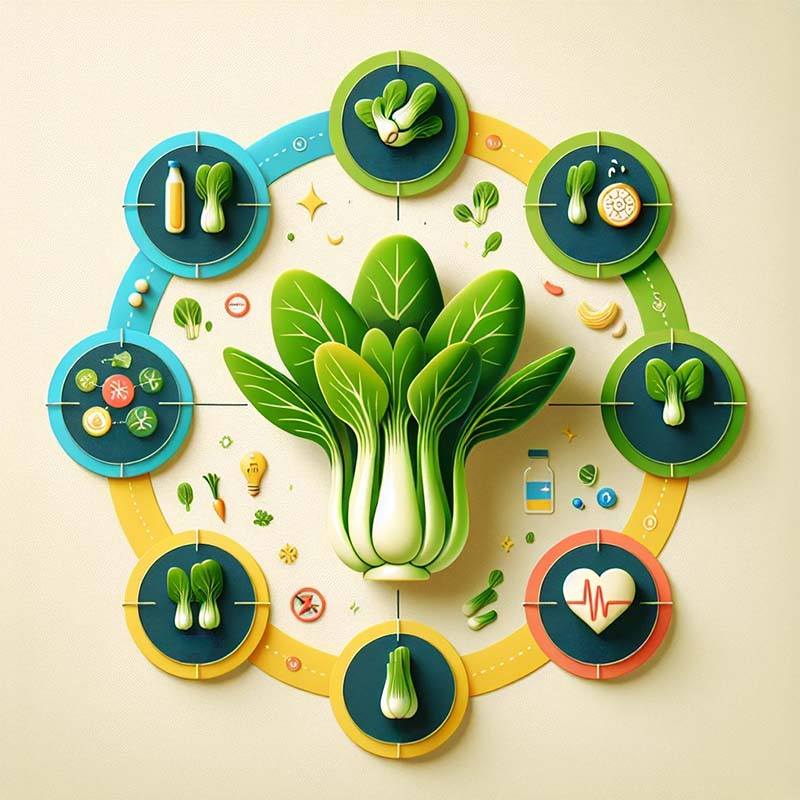
Enhance Bone Health
Bok choy is a powerhouse of bone-strengthening nutrients like calcium, phosphorous, iron, magnesium, and vitamin K. These elements are crucial for building and maintaining strong, healthy bones.

Reduce The Risk of Cancer
Cruciferous vegetables like bok choy are known for their cancer-fighting abilities. They are packed with vitamins C and E, beta-carotene, folate, and selenium. These antioxidants combat cell damage from free radicals, potentially lowering cancer risk.
Selenium is known for its tumor growth-slowing properties. Plus, the fiber in bok choy promotes digestive health, which could help in preventing colon cancer.
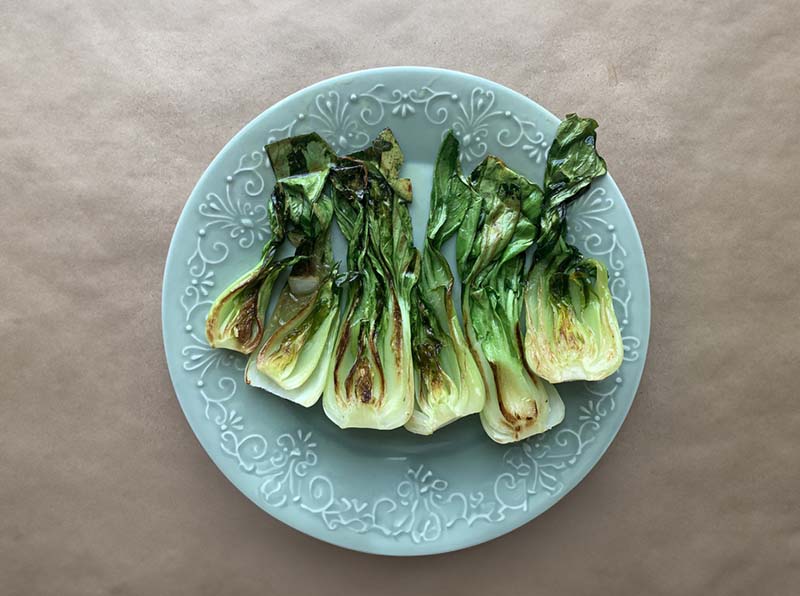
Reduce The Risk of Heart Disease
Bok choy contributes to heart health by providing folate and vitamin B6, which help eliminate homocysteine, a harmful compound in the blood that can damage blood vessels. Diets rich in leafy greens like bok choy are associated with a reduced risk of heart disease.

Enhance Eye Health
Often overshadowed by carrots in terms of eye health, bok choy is a great source of vitamin A and beta-carotene, crucial for maintaining eye health and reducing the risk of age-related eye diseases. A single cup of bok choy covers over half the daily recommended intake of vitamin A.
Anti-inflammatory
Bok choy contains quercetin, a flavonoid that reduces inflammation in the body. This can lower the risk of chronic diseases like heart disease, diabetes, and cancer.
Supports The Immune System
The selenium in bok choy bolsters the immune system, enhancing the body’s ability to fend off harmful pathogens.
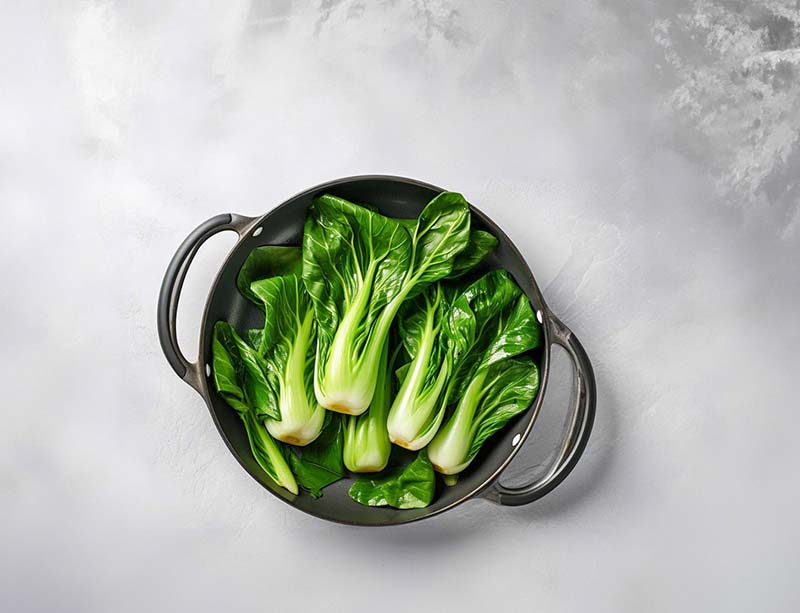
Regulate Blood Pressure
High in potassium, magnesium, and calcium, bok choy naturally aids in lowering blood pressure. Adequate potassium intake can counteract the effects of high sodium, reducing the risk of hypertension and related heart issues.
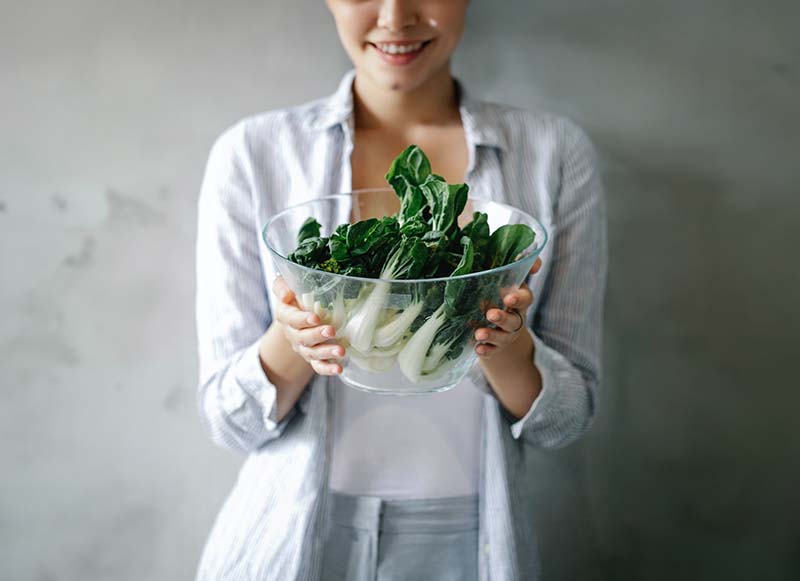
Supports Thyroid Function
As a good source of selenium, bok choy is essential for healthy thyroid function. Selenium aids in hormone production and protects the thyroid gland from oxidative damage.

Supports A Healthy Pregnancy
Folate is crucial during pregnancy, and bok choy is a great way to meet these heightened requirements. Adequate folate intake is vital for preventing birth defects such as spina bifida and anencephaly.

Improve Skin Health
Rich in vitamin C, bok choy fights free radicals, reducing sun, smoke, and pollution damage to the skin. Vitamin C also aids in collagen production, combating signs of aging like fine lines and wrinkles.
Supports The Treatment of Anemia
Bok choy’s iron content is essential for hemoglobin in red blood cells, facilitating oxygen transport throughout the body. Regular consumption can help prevent and treat anemia, characterized by fatigue and weakness.
Notes:
- To maximize nutrient absorption, pair bok choy with vitamin C-rich foods.
- Incorporate bok choy in diverse ways, such as in salads, soups, and stir-fries, to enjoy its full range of benefits.
- For pregnant women, bok choy can be a nutritious and easy addition to the diet to boost folate intake.
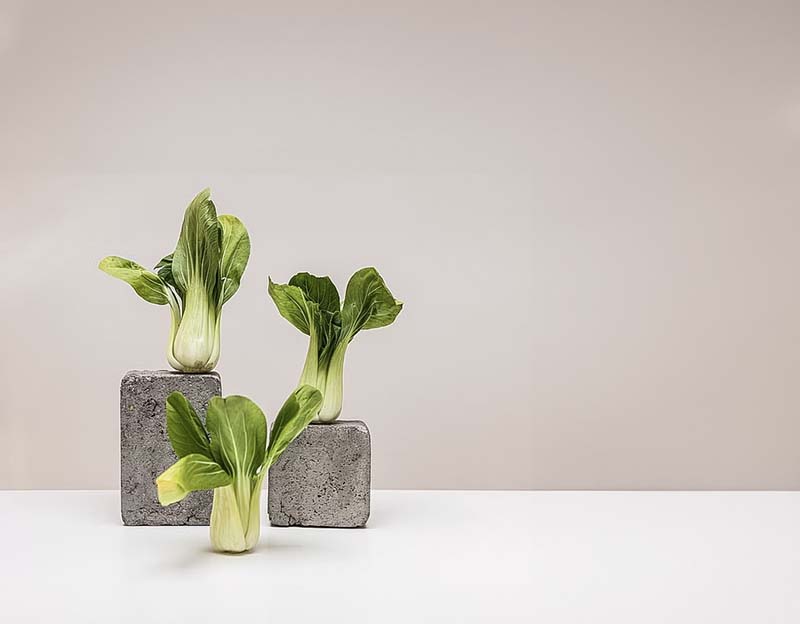
Bok Choy Allergy
Bok choy is usually not a food that causes allergies. Since bok choy is related to veggies like broccoli and cabbage, people who have issues with these might also react to bok choy. This is especially true for people with Oral Allergy Syndrome (OAS) – a condition where certain foods cause mouth itching, particularly in people who are sensitive to mugwort pollen. Usually, the itching from OAS is mild and doesn’t lead to serious problems.
Possible Negative Reactions to Consuming Bok Choy
Bok choy is a nutritious vegetable with many health benefits, but for some, eating it in large quantities could have drawbacks.
Raw cruciferous vegetables like bok choy contain an enzyme called myrosinase. This enzyme breaks down compounds in these veggies called glucosinolates. The substances that come from this breakdown might stop your body from absorbing iodine, which is important for thyroid health.
There was a rare case where an older lady ended up in intensive care for severe hypothyroidism and coma after eating 14–21 cups of raw bok choy every day for several months. While this is an extreme example, it highlights that problems mainly arise if you eat a lot of raw cruciferous vegetables for a long time.
Most research, including one review, suggests that eating normal amounts of bok choy doesn’t harm thyroid function. When you cook bok choy, it deactivates the myrosinase enzyme, so there’s no risk to your thyroid with cooked bok choy. Another point to consider is bok choy’s high vitamin K content.
This is important if you’re on blood-thinning medication, as big changes in vitamin K intake can affect how these medications work. Vitamin K is important for blood clotting. Just one cup of chopped bok choy gives you about 27% of your daily vitamin K needs.
If you’re taking blood thinners like warfarin, talk to your healthcare provider about how much bok choy you can safely eat.
Conclusion
Is Bok Choy Good for Weight Loss? Absolutely. This low-calorie, nutrient-rich vegetable is excellent for weight management, thanks to its fiber and essential nutrients. However, individual health factors should be considered, especially when consuming it in larger quantities.
We’d love to hear how Bok Choy has impacted your weight loss journey. Share your experiences and results with us and the Sure Life Health community. For more insights on health and wellness, visit Sure Life Health blogs for valuable tips and information on a healthier lifestyle
Professor Gaye Cunnane, PhD, MB, FRCPI
As the Director of Health and Wellbeing at RCPI, Professor Gaye Cunnane is at the helm of initiatives aimed at enhancing the health and well-being of RCPI Trainers and Trainees. Her role extends beyond administration; she is also a respected clinical professor of rheumatology and a consultant rheumatologist at Trinity College Dublin (TCD) and St James’s Hospital. Prof. Cunnane’s medical journey began at TCD, where she graduated from medical school, and her path has been marked by both clinical and academic excellence.
After completing her basic clinical training in medicine, she embarked on PhD studies at University College Dublin and St Vincent’s University Hospital. Her research during this period was focused on prognostic markers in early inflammatory arthritis, a project that saw her collaborating with esteemed universities across Europe, including in Switzerland, The Netherlands, the UK, and Sweden.
Prof. Cunnane’s career took her to the University of California, San Francisco, where she spent three years delving into research on new treatments for lupus. Her academic prowess led her to the University of Leeds in 2001 as a senior lecturer, before returning to Ireland in 2003 to assume her current roles. She has also served as the National Specialty Director for Rheumatology training in Ireland, Programme Director for Basic Specialist Training with RCPI, and as a past President of the Irish Society for Rheumatology.
PUBLISHED ARTICLES
“Rheumatic disease differentiation using immunoglobulin G sugar printing by high-density electrophoresis”: Published in The Journal of Rheumatology, this study reflects her in-depth investigation into rheumatic diseases.
“Benefits of exercise in patients with rheumatoid arthritis: a randomized controlled trial”: This research work, highlighting the positive impact of exercise on rheumatoid arthritis, underscores Prof. Cunnane’s dedication to practical, patient-centered research.
Additionally, Prof. Cunnane has made notable contributions to the Annals of the Rheumatic Diseases, discussing early referral, diagnosis, and treatment of rheumatoid arthritis. She has also been involved in a study on the NCBI platform investigating exercise benefits in rheumatoid arthritis patients.
Professor Gaye Cunnane’s career is a testament to her commitment to improving patient outcomes in rheumatology through rigorous research, clinical excellence, and dedicated teaching. Her work continues to influence the field of rheumatology, both in Ireland and internationally.

